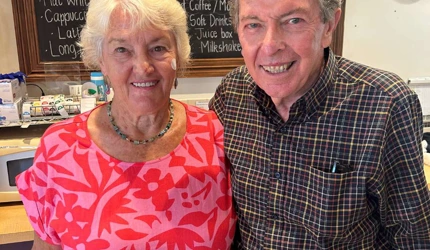In a thought-provoking piece published in The West Australian, Brightwater CEO Catherine Stoddart shares a compelling vision for redefining how we approach ageing. In her article, Cath challenges the conventional label of “old” that many associate with being 65.
Cath's article suggests that while some individuals might need support in their late 60s, many are still actively engaged in their careers and leading vibrant, fulfilling lives. By updating our age definitions, she argues, we can create a more effective and sustainable aged-care system that reflects the diverse experiences and needs of today’s older adults.
Her perspective is not about removing support but about enhancing the flexibility of care options. The goal is to ensure that support is available to those who genuinely need it, while allowing others to continue living independently in society.
Read the full article below to explore Cath's vision for a redefined approach to ageing.
"It’s time to reconsider how we define ageing and eligibility for aged-care services and have a brave conversation about raising the age eligibility for these services to 70.
Ageism still prevails when labelling someone as “old” — and by extension, frail and less capable based merely on a number like 65. We need to change the culture around ageism, challenge these outdated perceptions and embrace a more nuanced understanding of age and capability.
At 65, we are slapped with the label of “old” despite that many of us are either thriving in our careers or enjoying our best lives. Meanwhile, the pension age sits at 67, while seniors’ cards are available from 60 to 65 if living in WA or Queensland. These outdated markers of age are stuck in a bygone era. Consider generation X — adults born between 1965 and 1980. They start turning 70 in 10 years. Labelling them “old” and “ready for aged care” in five years is inaccurate and it doesn’t help the narrative around aged care. Many in this generation can still be active contributors to society, engaged in the workforce, and enjoying good health well into their 70s. It is unfair and economically unwise to cast them prematurely into the category of dependency.
Why view these fit, healthy, vibrant and engaged 65-70 year-olds as a financial burden on our system when we should see them as valuable assets whose continued independence can contribute to the economy rather than drain it?
This glaring disconnect between our actual lives and rigid age definitions imposed on us is not just a minor oversight — it’s a barrier to addressing the aged-care crisis. Until we redefine what it means to be old and align our policies and legislation with today’s realities, we’ll continue to flounder in our efforts to fix a system that is under pressure.
Our perceptions and policies have failed to keep pace with the changing demographics and longer life expectancies. Having an honest, respectful conversation about shifting the aged-care eligibility age will assist in freeing up costs and funding for those that need it, and ensure that care, clinical services and support reflect the true needs and capabilities of today’s older adults.
It’s not an easy conversation but it’s one we need to have.If we are serious about making aged care sustainable and affordable for the Commonwealth and for providers, we need to confront the economic implications of these outdated demographics. It’s central to improving the aged-care system. Raising the age threshold is a powerful lever for financial reform and it allows for more strategic, long-term planning. It ensures aged-care funding models are capable of caring for the 3.5 million Australians expected to access aged-care services in the next 25 years. It’s a bold call but it aligns with today’s realities — people have longer and healthier lives and deserve to be supported in maintaining their independence.
Age demographics are fundamentally linked to the financial dynamics of aged care, a connection that highlights the urgent need for clarity on aged-care funding arrangements yet to be released in the aged-care task force report. Until we know our funding models, the aged-care sector is unable to invest in infrastructure and technology, build facilities, upgrade others or support the future of home care. These solutions are tied to the financial framework set by the task force.
Will the Government’s delay cost lives? Perhaps not directly, but it means we continue to carry a burden that profoundly impacts the quality and length of older people’s lives. The last 1000 days of their life is diminished. Without certainty, this year, 2500 Australians will remain confined to hospitals when they should be getting care in a facility or benefiting from a Commonwealth Home Care Package. Many will return home to inadequate care or support.
This is not just about numbers; it’s about real people’s lives, dignity, and their right to spend their final years comfortable and happy. The delay denies them this right. The task force reforms is the direction and financial certainty we need to plan for an improved model of aged care for all Australians. Changing the age threshold may not be a winning political conversation but financial certainty for the sector is a solution to the aged-care emergency."
Hear more from Brightwater CEO
Listen to Cath’s discussion on 6PR, where she delves deeper into her views on ageing and aged care.



